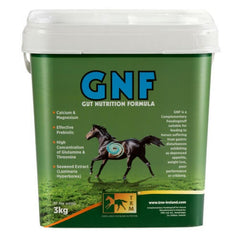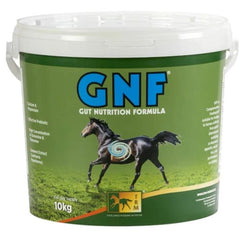Your Cart is empty
Gut Nutrition Formula
Shipping & taxes calculated at checkout
SHIPPING INFO
What is GNF?
GNF (Gut Nutrition Formula) is a unique supplement, for daily feeding to horses prone to gastric disturbances. GNF plays a role in maintaining optimum gut health and function, allowing maximum utilisation of feed.
Benefits you can expect when feeding GNF
- Improved appetite, if your horse is not eating all it's feed now, then it is possible that once you start feeding the GNF it could start licking out it's feed bowl
- Normal Manure, if your horse has the scoures or diahorea, then feeding GNF could change this.
- Improve top line and gain weight, if your horse is struggling to hold condition, or it's top line has dropped off and is struggling to hold it's weight or losing weight, then GNF could turn this situation around.
- Improved temperament and moods, often times a horse has a bad or sour disposition because it is uncomfortable in the gut, GNF can make a huge change to a horses temperament.
- Gastric Ulcer aid, GNF is not a treatment for ulcers, however it can maintain the stomach in good condition after a ulcer treatment to stop a reoccurance of ulcers
- Improved coat condition, many horses look 'like a greyhound' or just lose that nice glow, because of internal niggling minor ulceration issues effecting their health and welbeing, GNF can help bring back that beautiful glow to the coat.
What is in GNF PELLETS?
- Fructooligosaccharides – a prebiotic which feeds the beneficial bacteria in the hind gut, resulting in healthier good digestive bacteria, helping the horse to better digest and absorb the nutrition you are feeding them. Many times I have identified whole grains in the horses manure, in fact the birds come down and pick them out, this means that the food is not being digested properly and you are throwing away good feed.
- Glutamine – an important amino acid for the repair of epithelial cells, so if there has been damage from gastric ulcers, this actually helps repair that damage.
- Threonine – an amino acid, if restricted may limit intestinal mucin synthesis.
- Calcium Carbonate and Magnesium Hydroxide – these alkaline materials neutralize excessive Ph, both of these are very alkaline and therefore when they go into the stomach with the feed, they have the effect of reducing the acidity making it less damaging for the non glandular section of the stomach.
- Seaweed Extract – this turns into a gel like substance, quite sticky and creates a floating raft of gel on top of the contents in the stomach, which protects the non glandular part of the stomach from acid splash.
- Minerals: GNF contains both Calcium and Magnesium: two components which are key nutrients in maintaining a healthy digestive system, and as mentioned above are alkaline, reducing the acidity in the stomach.
Why are gastric ulcers so common?
Up to 93% of Racehorses and 60% of Sports horses have been found to suffer from ulceration after endoscopic examination (Hammond et al [1986]). Other reasons for the high prevalence of gastric ulcers can be attributed to high concentrate/low forage diets; stall confinement; stress induced by exercise; mixing with strange animals and introduction to new surroundings. Foals may also become extremely stressed at weaning due to diet change and separation from the mare which can initiate the formation of gastric lesions. Proper nutritional support is a vital component in ensuring that valuable competition horses maintain a healthy digestive system during training.
What are the Symptoms of Gastric Ulcers?
All or any of the following may indicate EGUS:
- Loss of condition, appetite and weight loss.
- The "poor do-er" that you can't get right.
- Staring, dull coat or colic symptoms
- Reduction in performance and stamina.
- Stable vices: wind sucking or crib biting, unsettled in training.
- Sour disposition, avoiding hard feed – preferring hay.
These symptoms are the results of physical discomfort and inefficient utilisation of nutrients due to lesions on the gastric endothelium.GNF is a combination of minerals, amino acids, and a prebiotic which have a role in general metabolism and are required for normal feed conversion. It should be used to complement the feed of horses.
Feeding Instructions - GNF PELLETS
GNF pellets should be added to the normal feed ration.
Adult Horses: Feed 50g twice daily.
Foals: Feed 25g twice daily.
Fresh drinking water should be available at all times.
Complementary feed Supplement for horses.
SHIPPING INFO
All products in stock - if ordered before 1pm will be despatched same day.







